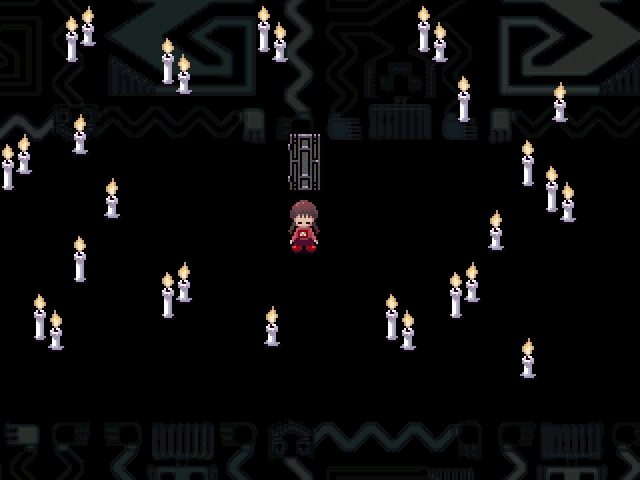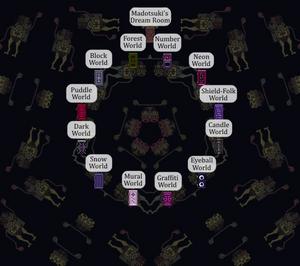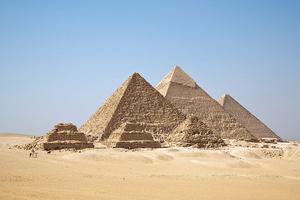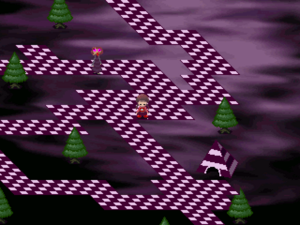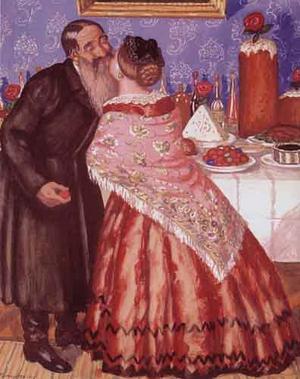>Mt.kiki No edit summary |
(cleanup) |
||
| (44 intermediate revisions by 5 users not shown) | |||
| Line 1: | Line 1: | ||
[[File:Candleworld.jpg | [[File:Candleworld.jpg|frame|left|Candle World]] | ||
==Candlemas== | |||
The [[wikipedia:Presentation of Jesus at the Temple|Presentation of Jesus at the Temple]], which falls on 2 February, celebrates an early episode in the life of [[wikipedia:Jesus|Jesus]]. | |||
== | |||
The | |||
Other traditional names include '''''Candlemas'''''. | Other traditional names include '''''Candlemas'''''. | ||
==The Twelve Great Feasts== | |||
[[File:Nexusmap.JPG|thumb|The Nexus is known for its twelve outbound doors.]] | |||
== | |||
The feast of the resurrection of Jesus, called [[wikipedia:Easter|Pascha (Easter)]], is the greatest of the feasts of the [[wikipedia:Eastern Orthodox Church|Eastern Orthodox Church]], called the "feast of feasts". | |||
In addition, there are other days of great importance in the life of the Church — the [[wikipedia:great feasts in the Eastern Orthodox Church|great feasts in the Eastern Orthodox Church]] are ''twelve'' in number. | |||
{| class="wikitable" | |||
{| | ! colspan="2"|Feast | ||
! colspan="2"| | ! Corresponding to | ||
! | |||
|- | |- | ||
| colspan="2"|Pascha (Easter) | |||
| [[Yume Nikki:Nexus|Nexus]] | |||
|- | |- | ||
|1 | |1 | ||
|September 8, the [ | |September 8, the [[wikipedia:Nativity of the Theotokos|Nativity of the Theotokos]] | ||
| | |(Undecided) | ||
|- | |- | ||
|2 | |2 | ||
|September 14, the [ | |September 14, the [[wikipedia:Exaltation of the Cross|Exaltation of the Cross]] | ||
| | |(Undecided) | ||
|- | |- | ||
|3 | |3 | ||
|November 21, the [ | |November 21, the [[wikipedia:Presentation of the Theotokos|Presentation of the Theotokos]] | ||
|The Stairway to [ | |The [[Yume Nikki:Wilderness#Stairway to the Sky|Stairway to the Sky]] leading to the [[Yume Nikki:Sky Garden|Sky Garden]]. | ||
|- | |- | ||
|4 | |4 | ||
|December 25, the [ | |December 25, the [[wikipedia:Nativity of Christ|Nativity of Christ]] (Christmas) | ||
|[[Snow World| | |[[Yume Nikki:Snow World|Snow World]] | ||
|- | |- | ||
|5 | |5 | ||
|January 6, the Baptism of Christ | |January 6, the Baptism of Christ — [[wikipedia:Theophany|Theophany]], also called [[wikipedia:Epiphany (Christian)|Epiphany]] | ||
|[[Pink Sea]] | |[[Yume Nikki:Pink Sea|Pink Sea]] | ||
|- | |- | ||
|6 | |6 | ||
|February 2, the [ | |February 2, the [[wikipedia:Presentation of Jesus at the Temple|Presentation of Jesus at the Temple]] (Candlemas) | ||
|[[Candle World| | |[[Yume Nikki:Candle World|Candle World]] | ||
|- | |- | ||
|7 | |7 | ||
|March 25, the [ | |March 25, the [[wikipedia:Annunciation|Annunciation]] | ||
| | |(Undecided) | ||
|- | |- | ||
|8 | |8 | ||
| | |The Sunday before Pascha – [[wikipedia:Palm Sunday|Palm Sunday]] | ||
The Sunday before Pascha | |(Undecided) | ||
| | |||
|- | |- | ||
|9 | |9 | ||
|Forty Days after Pascha | |Forty Days after Pascha – the [[wikipedia:Ascension of Jesus Christ|Ascension]] of Christ | ||
| | |(Undecided) | ||
|- | |- | ||
|10 | |10 | ||
|Fifty Days after Pascha | |Fifty Days after Pascha – [[wikipedia:Pentecost|Pentecost]] | ||
| | |(Undecided) | ||
|- | |- | ||
|11 | |11 | ||
|August 6, the [ | |August 6, the [[wikipedia:Transfiguration of Jesus|Transfiguration]] | ||
| | |(Undecided) | ||
|- | |- | ||
|12 | |12 | ||
|August 15, the [ | |August 15, the [[wikipedia:Dormition|Dormition]] (sleep) of the Theotokos | ||
|[[ | |[[Yume Nikki:Number World#Bed Room|Number World Bed Room]] | ||
|} | |} | ||
==Pyramids== | |||
[[File:All_Gizah_Pyramids.jpg|thumb|left|The ancient pyramids of Egypt]] | |||
[[File:Checkerpath1.png|thumb|the striped pyramid (pictured right)]] | |||
A pyramid-shaped candle was used around 1550 B.C. in Ancient Egypt. | |||
[[wikipedia:Pliny the Elder|Pliny the Elder]] of the Roman Empire is in a work "[[wikipedia:Natural History (Pliny)|Natural History (Pliny)]]" <ins>no idea what this means</ins> | |||
==Paskha== | |||
[[File:Paskhakustodiev.jpg|thumb|Boris Kustodiev's Easter Greetings (1912). Such foods as red eggs, kulich, and a white, triangular paskha in the background.]] | |||
“テーブルの上にピラミッド形のパスハ(左)とクリーチ(右)が描かれている。” | |||
“Kulich (right) are depicted pashka pyramidal (left) and on the table.” | |||
http://ja.wikipedia.org/wiki/%E3%83%91%E3%82%B9%E3%83%8F_(%E8%8F%93%E5%AD%90) | |||
In the [[wikipedia:Russian Orthodox|Russian Orthodox]] tradition, [[wikipedia:Paskha (dish)|pashka]] is usually molded in the form of a truncated pyramid (a symbol of the [[wikipedia:Christian church|Church]]; also said to represent the [[wikipedia:Holy Sepulchre|Tomb of Christ]]). It is traditionally made in a wooden mould assembly called "пасочница" (''pasotchnitza'') that can be taken apart for cleaning; but more modern materials, such as plastics, are used nowadays. | |||
==Dwarf== | |||
The story of Snow White involves seven dwarfs and falling asleep. Candle World is also one of the five Nexus worlds to hold a [[Yume Nikki:Beds|bed]]. | |||
==Walking Candles== | |||
A superstition in the [[wikipedia:Middle ages|middle ages]] was to form [[wikipedia:Wax sculpture|wax sculptures]] of hated persons, into which long pins were thrust, in the confident expectation that thereby deadly injury would be induced to the person represented. <ins>voodoo?</ins> | |||
This practice was considered more effective when some portion of the victim's hair or nails were added to the wax figure, thus strengthening the connection with its actual subject. | |||
[[Category:Yume Nikki theoretical discussions by Mt.kiki]] | |||
Latest revision as of 10:04, 20 November 2024
Candlemas
The Presentation of Jesus at the Temple, which falls on 2 February, celebrates an early episode in the life of Jesus.
Other traditional names include Candlemas.
The Twelve Great Feasts
The feast of the resurrection of Jesus, called Pascha (Easter), is the greatest of the feasts of the Eastern Orthodox Church, called the "feast of feasts".
In addition, there are other days of great importance in the life of the Church — the great feasts in the Eastern Orthodox Church are twelve in number.
| Feast | Corresponding to | |
|---|---|---|
| Pascha (Easter) | Nexus | |
| 1 | September 8, the Nativity of the Theotokos | (Undecided) |
| 2 | September 14, the Exaltation of the Cross | (Undecided) |
| 3 | November 21, the Presentation of the Theotokos | The Stairway to the Sky leading to the Sky Garden. |
| 4 | December 25, the Nativity of Christ (Christmas) | Snow World |
| 5 | January 6, the Baptism of Christ — Theophany, also called Epiphany | Pink Sea |
| 6 | February 2, the Presentation of Jesus at the Temple (Candlemas) | Candle World |
| 7 | March 25, the Annunciation | (Undecided) |
| 8 | The Sunday before Pascha – Palm Sunday | (Undecided) |
| 9 | Forty Days after Pascha – the Ascension of Christ | (Undecided) |
| 10 | Fifty Days after Pascha – Pentecost | (Undecided) |
| 11 | August 6, the Transfiguration | (Undecided) |
| 12 | August 15, the Dormition (sleep) of the Theotokos | Number World Bed Room |
Pyramids
A pyramid-shaped candle was used around 1550 B.C. in Ancient Egypt.
Pliny the Elder of the Roman Empire is in a work "Natural History (Pliny)" no idea what this means
Paskha
“テーブルの上にピラミッド形のパスハ(左)とクリーチ(右)が描かれている。”
“Kulich (right) are depicted pashka pyramidal (left) and on the table.” http://ja.wikipedia.org/wiki/%E3%83%91%E3%82%B9%E3%83%8F_(%E8%8F%93%E5%AD%90)
In the Russian Orthodox tradition, pashka is usually molded in the form of a truncated pyramid (a symbol of the Church; also said to represent the Tomb of Christ). It is traditionally made in a wooden mould assembly called "пасочница" (pasotchnitza) that can be taken apart for cleaning; but more modern materials, such as plastics, are used nowadays.
Dwarf
The story of Snow White involves seven dwarfs and falling asleep. Candle World is also one of the five Nexus worlds to hold a bed.
Walking Candles
A superstition in the middle ages was to form wax sculptures of hated persons, into which long pins were thrust, in the confident expectation that thereby deadly injury would be induced to the person represented. voodoo?
This practice was considered more effective when some portion of the victim's hair or nails were added to the wax figure, thus strengthening the connection with its actual subject.

